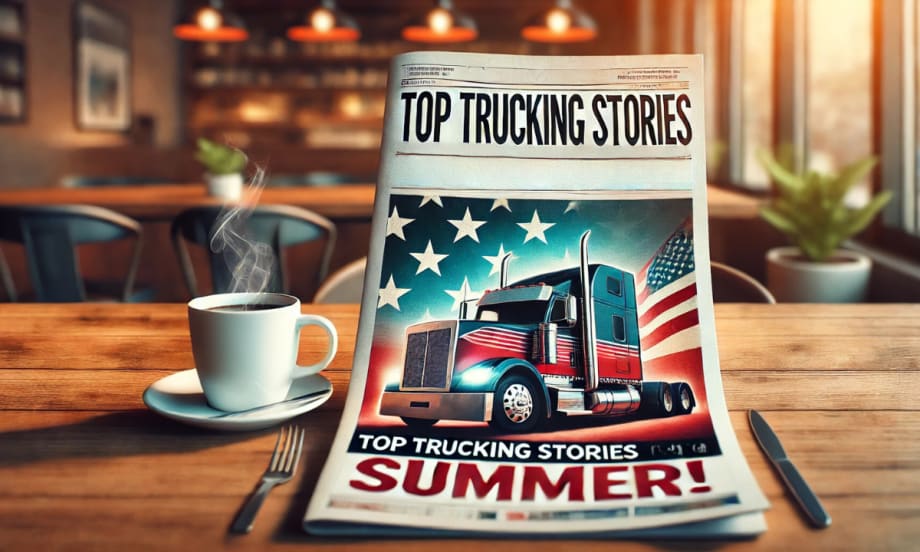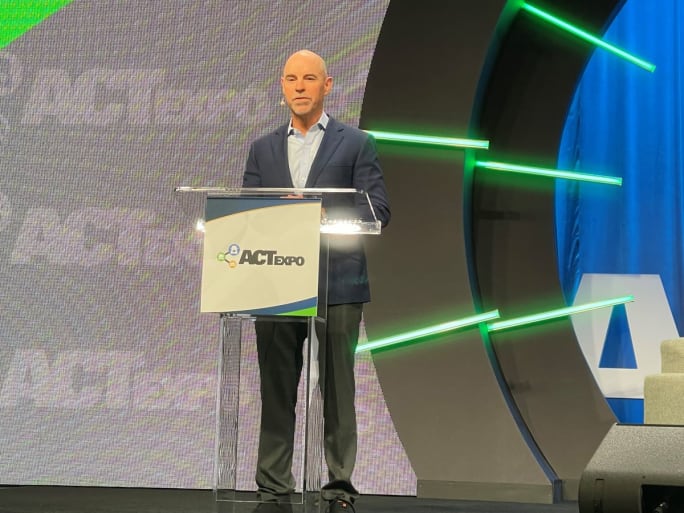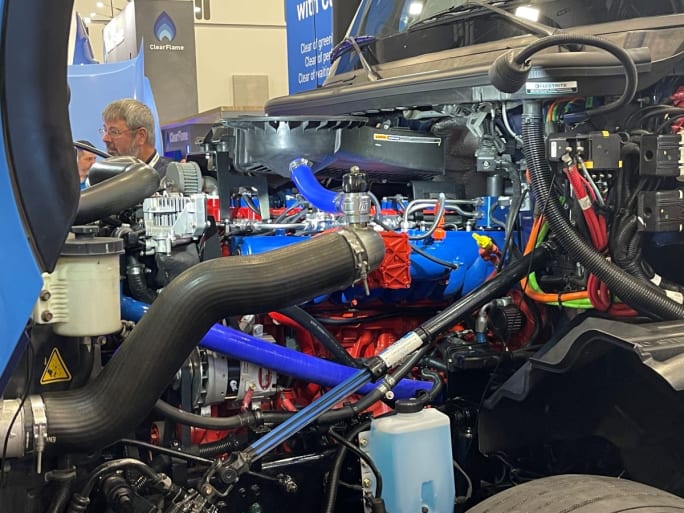College football kicked off this past weekend. And that’s as good a signal as any that the summer of 2024 is winding down.
And while it’s generally a slow time in trucking, a fair amount of big news stories hit the headlines at HDT this summer.
Summer is usually a pretty slow time of year in trucking. But a lot of major news broke in the trucking industry over this past summer. HDT executive editor Jack Roberts takes a look back.

The Summer of 2024 generated a lot of important news for the North American trucking industry.
This is an AI-generated image. Reffer to our terms of use.
College football kicked off this past weekend. And that’s as good a signal as any that the summer of 2024 is winding down.
And while it’s generally a slow time in trucking, a fair amount of big news stories hit the headlines at HDT this summer.
Here’s a quick rewind looking back at the Summer 2024 – in case you missed any of these major stories that hit the headlines.
Perhaps the most important news story for fleets this summer has been the massive truck recall for Kenworth, Freightliner, International, Peterbilt and Western Star medium- and heavy-duty trucks.

A major medium- and heavy-duty truck recall has been issued for almost 8,000 vehicles in North America.
Photo: HDT
The problem is experimental steering components that accidently found their way onto truck production lines. The components – ball studs – can fail. And if they do, a driver can lose all control of the truck.
The story first broke in late June. And by July, the situation was serious enough that Paccar felt compelled to issue a rare “Do Not Drive” warning to fleets until the defect was fixed.
By August the recall had spread to include International and Daimler vehicles.
This is still very much a major issue for the North American trucking industry. And if your fleet is running new trucks built this year by the affected OEMs, it is well worth taking a few minutes to confirm if your vehicles need to get to a dealer for repairs ASAP.
There were signs that the trucking industry was not happy with the state of play as we draw closer to the Environmental Protection Agency’s 2027 Phase 3 Greenhouse Gas regulations.

J.B. Hunt CEO Shelley Simpson told ACT Expo attendess that more work has to be done before electric trucks are ready for widescale fleet deployment.
Photo: Jack Roberts
But at the Advanced Clean Transportation Expo (ACT Expo) in Las Vegas in May, what had been limited to muttered grumblings within the industry morphed into full-blown alert to the industry that all is not well yet with the deployment of electric trucks in North America.
What looked to be a fairly routine ACT Expo was upended when two major industry players, J.B. Hunt and Ryder System pulled the fire alarm to warn colleagues that their initial trials with battery-electric trucks were seeing higher costs and decreased efficiencies across a wide range of fleet operations.
To be clear, both Ryder and Hunt said the potential for electric trucks remains promising. But, at the moment, the trucks simply are not operating on cost and productivity parities with diesel-powered units. In many cases, these are due to factors beyond the fleets’ control (such as high acquisition costs and lack of charging infrastructure).

Ryder System CEO Robert Sanchez told ACT Expo attendees early operating costs for electric trucks were much higher than Ryder fleet analysts expected.
Photo: Jack Roberts
But it is obvious now that major red flags are being waved by the trucking industry heading into 2027. And it will be interesting to see how this story – and any additional industry pushback against the California Air Resource Board (CARB) and EPA -- grows in coming months.
Battered and unloved by regulators, the diesel engine nonetheless keeps battling to prove that it still has a major, long-term role to play in North American trucking applications.
And a whole slew of stories over the summer clearly indicates that cleaner and greener diesel engines will be powering trucks into 2027 and beyond.
For starters, we saw a whole host of new, CARB-compliant engines being released by major OEMs over the Summer, including Peterbilt and Kenworth.
Cummins made major headlines in August by offering journalists a first-look at its 2027 X15 diesel engine.
And Volvo also released a CARB-Omnibus compliant diesel engine.

Lars Stenqvist, chief technology officer, the Volvo Group, says diesel engines have a long future head of them in trucking applications.
Photo: Jack Roberts
But the Swedish OEM -- never shy when it comes to telling people what it thinks -- didn’t stop there. Over the course of the Summer, Volvo also gave its full-throated support of diesel engines both today and heading into the future. In fact, Volvo is even arguing that cleaner and greener high-horsepower engines will have a role to play in trucking moving out beyond 2027 and for many years to come.
Regardless of messaging, diesel ICEs are still Public Enemy Number One in the eyes of CARB and the EPA. And so the hunt is on for some kind of zero-emission, liquid-fuel engine that can replace diesel fuel in long-haul applications.
And, at the moment, all hopes are hanging on liquid hydrogen as that future fuel.
At ACT Expo, Bosch showcased the efforts being made by a wide range of industry players to collectively develop a hydrogen truck engine.

A consortium of industry players, including Bosch, are working hard to develop a liquid-hydrogen truck engine in the near future.
Photo: Jack Roberts
Volvo is working on its own hydrogen ICE, the OEM announced.
Cummins is as well.
An Engine Technology Forum webinar in July fueled more hope that this technology will lead to hydrogen-powered trucks in just a few years.
But, while there’s currently a lot of hope and hype surrounding hydrogen ICEs, it’s worth noting that not everyone is convinced that liquid hydrogen will prove to be a workable fuel solution for heavy trucks.
This is a story that is clearly going to play out in unpredictable ways coming months. So, as I said above regarding electric trucks – stay tuned!
Stay tuned.
Marijuana is now legal in more states than it is illegal.
For Boomers and GenXers, that is a truly bewildering reality, given how vilified weed was in our younger years.
And as marijuana use becomes more mainstream, the debate on whether or not to allow commercial drivers to use the drug for either medical or recreational purposes in their off time has grown more heated.
Some in the industry argue that the prohibition is an outdated law that only hurts an industry desperate for qualified drivers.
Meanwhile, the Old Guard that still holds sway in the industry insists allowing drivers to use marijuana would be a major blow to safety and professionalism in trucking.

The debate over commerical drivers and marijuana use continues to divide the trucking industry.
Photo: HDT
For now, there is little appetite for any real change on this issue – even from the supposedly far-left Biden administration.
But odds are this is a story that is only going to become more mainstream – and more heated – in the future.
Once again – Stay tuned!
HDT's Monthly Trucking Newsletter looks back on the top stories from January, 2026.
Read More →After a bruising year for trucking, CES 2026 felt subdued. Until it suddenly offered a glimpse of trucking's next disruption and reminded everyone that technology never waits for the next freight cycle.
Read More →Computers never get angry. And that's a good thing on crowded stretch of interstate.
Read More →Old trucks generally get ignored in classic car circles. Maybe that's changing.
Read More →Climate legislators overreached badly with the Advanced Clean Fleets rule. And now they’re paying a heavy price for their arrogance.
Read More →The past year has been a rough one for climate activists. What would it mean for the trucking industry’s premier clean-fleet technology trade show?
Read More →In many ways, the ultra-modern Mack Pioneer marks a return to the OEM’s storied roots.
Read More →The mood on the show floor at the 2025 TMC Annual Meeting in Nashville March 10-13 was upbeat. A new attendance record and newfound optimism regarding the economy and the regulatory landscape were evident and largely outweighed any reservations regarding Trump's tariffs and trade wars.
Read More →Financial speculators are investing money in “nuclear verdict” court cases in hopes of walking away with millions in settlement dollars — often in trucking. It’s ghoulish. It’s wrong. And it needs to be stopped.
Read More →The reelection of Donald Trump raises more questions than clarity about the state of trucking and Phase 3 Greenhouse Gas Emission regulations.
Read More →